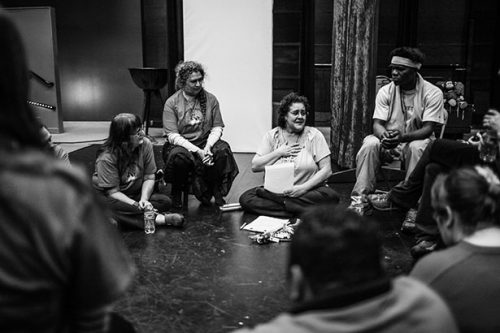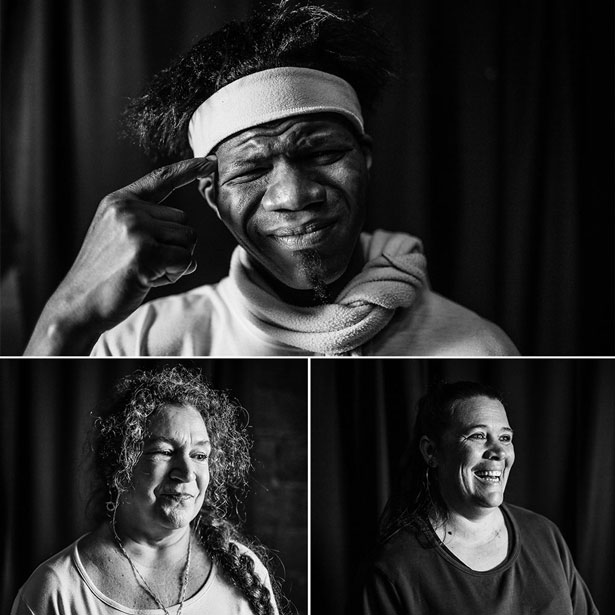
photos by trask bedortha
In theater as in life, timing is everything, though just showing up is a good start. And at the Healing Trauma Project on Coburg Road, where performers have been rehearsing in anticipation of its Feb. 7 show at Wildish Theater, the cast of Transformational Personal Theatre has definitely shown up, in itself a small miracle. These are people who, all things being equal, might not have shown up at all.
As well as being newfound actors and dancers and singers and poets, the folks at this rehearsal are addicts in recovery. They have had their struggles with drugs and alcohol and food addiction. Now they have gathered to transform their personal stories of pain and renewal into the stuff of performance.
They are, in essence, learning to stage their deepest selves as works of art — to turn themselves from victims to survivors through the positive alchemy of the creative process.
Not Here: From Howling Hurt to Healing Hope is the brainchild of Judith Voss, founder and artistic director of Transformation Personal Theatre, or TPT. Despite holding a masters in counseling psychology and a doctorate in special education, Voss choses to forego the strictures of standard therapy — the couch-and-talk model — for the more dynamic processes of fostering creativity as a means to overcoming trauma.
“What I am interested in is creative expression as a way of connecting or becoming reacquainted with one’s soul,” Voss says. “In my experience, the failure of one’s soul to thrive leads to great maladies of spirit, which in turn leads to depression, illness, addiction and a sense of being a living dead person, going through the motions of life in an existential crisis of loss of meaning and purpose.”
In anticipation of the project, Voss in August placed an ad in local papers, calling for people in recovery who might be interested in performing in a theater project focused on wellness and healing, “No performance experience necessary.” The folks who volunteered, men and women spanning the age spectrum and recovering from various addictions, are now involved in creating a staged work that delves into the darkness and light of their true-life stories.
The idea, Voss says, is to take that core hurt at the center of an addict — a hurt often compounded by years of shame and secrecy — and bring it to the surface as part of a communal theater experience.
But wait, you might say: Isn’t enacting those stuck places of pain and angst exactly what any artist does in creating her art? Perhaps, but for addicts in recovery, just surviving can be an intimidating proposition, much less turning their pain into the stuff of art. At TPT, however, the idea of who can be an artist is radically egalitarian.
This notion of inclusive creativity runs counter to our consumer culture with its cult of celebrity, but it’s an especially foreign concept to people trapped in the hell of addiction. Voss says, “I have a hunger in my heart to make those who are outcasted, shunned and devalued, for whatever reason, feel that they are not only worthy, but also quite possibly the most gifted among us.”
It’s about process, really. What that process looks like at ground zero, among a group of recovering addicts, is gloriously chaotic, like a series of baby steps met with joy, support and bursts of hilarity.
During the several rehearsals I attended, the cast buzzed and hummed in nervous anticipation. There were lots of hugs, and “I love you” was heard regularly. Contrary to what you might think, recovery is largely an upbeat affair, focused on fellowship and unconditional support. Even as each individual member of the cast sought to hone his or her particular act, the group remained the primary focus.
Not Here is divided into two acts, the first dealing with the ravages of addiction and the second with the inspiration of recovery — the howl, then the hope. There are several ensemble pieces interspersed throughout, and they are perhaps the most moving of the whole production: The show opens with actors, wearing masks of their own making, crawling and hissing across the stage like rabid animals, an analogy of the addict’s double life, trapped inside an alienating second skin of need and desperation.
The individual set pieces offer a broad perspective on each performer’s path from addiction to recovery and, like some infernal vaudeville, they utilize a variety of forms. There is stand-up, interpretive dance, spoken-word pieces, poetry, vocal numbers — all of them culled from the intensely personal experiences of their creators and shaped by a recently discovered or reawakened artistic impulse. These pieces are raw and honest, and as jagged and joyous as life itself.
“These are people who have felt called to tell their personal stories as a way to release the angst of the power and grip of painful life experiences,” Voss says, adding that audiences attending the Feb. 7 production should expect “a show very different in intent and presentation than traditional scripted theater.”
For instance, an interpretive dance piece by Wendy Lopez titled “A Heroin Love Affair” channels the reeling fear of being strung-out through an idiosyncratic style that achieves a form of strangled grace; while Johnny Cash’s “Hurt” plays, Lopez flows across the floor like an earthbound ghost, reaching desperately toward the sky before collapsing in anguish. “It helped me out of my shell,” Lopez says about coming to perform for TPT. “I’m not an expressive person normally, and to get out in front of an audience and do something that’s not my craft is scary but exciting at the same time. It’s a new high.”
Mark Rolle, whose stand-up routine tackles issues of race, homelessness and meth addiction, says that working with TPT has been one of the greatest experiences he’s had. “It changed my life dramatically, because I have a sense of community, a sense of security in a way that could help me move forward,” he says.
A native of the Bahamas who wound up in Eugene by way of Virginia, Rolle — who also goes by the handle MC Rolle — says that his stand-up comedy is meant to be double-edged, inspiring laughter and thought at once. “I’m joking about it to make people laugh, but I’m telling the God’s honest truth. When they hear me, they’ll go in one way and leave saying, ‘You know, that’s messed up.’”
 |
|
Transformational Personal Theatre’s Mark ‘MC’ Rolle, TPT’s Virginia Ashe and TPT’s Wendy Lopez
|
There it is: messed-up truth turned into healing art. TPT combines artistic self-expression with the self-discovery necessary to recovery, and the two modes compliment each other well. “There is a significant body of evidence showing the importance of creative expression for the well-being of humans,” says Shelby Cain, a mental health counselor at White Bird Clinic’s Chrysalis services who, along with financial support from White Bird, is offering her counseling skills to the troupe.
“I love hanging out in the freedom of this environment which one does not find in the typical mental health setting,” Cain says of working with TPT. “The benefits of play, musical expression, drama and art are endless. Creative expression allows people to tell their personal story and express feelings in appropriate ways, thus reducing the likelihood of self-harm and secondary trauma to others.”
Voss says that, as artistic director, she views herself as merely a “conduit of creative inspiration,” and that her primary concern is to establish group cohesion by fostering a sense of safety and trust. “For me, it is always a very palatable, very exciting moment when a group becomes a group,” she says. “For me, facilitating creative expression is always a spiritual act.”
Transformation Personal Theatre’s Not Here: From Howling Hurt to Healing Hope, the Alchemy of Addiction Recovery plays one show only 7pm Saturday, Feb. 7, at Wildish Theatre in Springfield. Admission is free, though donations are being accepted; call 554-3337 or visit http://wkly.ws/1wl.